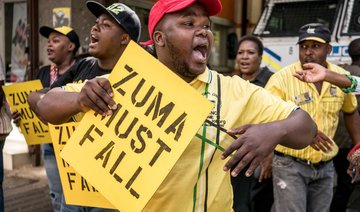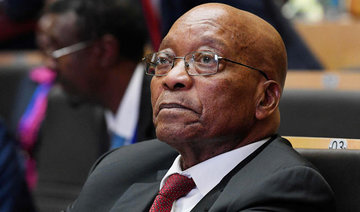JOHANNESBURG: Top leaders of South Africa’s ruling ANC will meet Monday to “finalize” the departure of embattled President Jacob Zuma after party chief Cyril Ramaphosa promised to bring “closure” to the crisis.
Ramaphosa said at a party rally in Cape Town on Sunday he wanted to replace “a period of difficulty, disunity and discord” with “a new beginning” for the party.
“We know you want this matter to be finalized,” he said to rapturous cheering, vowing to tackle the corruption that has tarnished Zuma’s government.
Zuma has clung to power after rejecting a request by his party’s senior officials to resign a week ago.
The powerful committee could recall the president from office, though he would be under no constitutional obligation to obey the order.
“We know you want closure — we will be doing so keeping our eyes on what is in the interests of all our people,” Ramaphosa said to loud applause on Sunday.
“The National Executive Committee of the ANC will be meeting tomorrow to discuss this very matter — and because our people want this matter to be finalized, the NEC will be doing precisely that.”
Litha Madita, 48, an NGO worker from Cape Town, welcomed the announcement of the NEC meeting, adding that Ramaphosa has spoken “to the aspirations of the South Africans.”
“It brings hope that there is a new venture we are getting into.
“But we have to respect (Zuma) as a former president of the ANC. It is important not to disrupt the country or bring violence into the country.”
Zuma’s presidency has been marred by corruption scandals, slow economic growth and record unemployment that have fueled public anger.
The stalemate over Zuma’s departure has left Africa’s most developed economy in limbo, with a series of public events canceled last week including Thursday’s State of the Nation address to parliament.
Opposition parties last week had threatened a “national shutdown” in response to Zuma’s refusal to resign — although it was unclear if the action would go ahead.
Zuma’s hold over the ANC was shaken in December when his chosen successor — his former wife Nkosazana Dlamini-Zuma — narrowly lost out to Ramaphosa in a vote to be the new party leader.
Sunday’s rally was part of ANC celebrations marking 100 years since late leader Nelson Mandela’s birth — as well as efforts by Ramaphosa to try to revive the party’s tainted reputation ahead of next year’s general election.
“We have arrived at a moment in the history of our country where we can relive that moment when Nelson Mandela was released... we have a new mood right across the country, we can capture that mood and move forward,” said Ramaphosa.
He was speaking to mark the 28th anniversary of the speech Mandela gave in the same location after being released from prison.
It is understood that a key sticking point in the negotiations is the potentially ruinous legal fees Zuma is facing from prolonged court battles against multiple criminal cases.
He is also reportedly seeking legal protection for his family and other associates who have been involved in controversial deals.
“Even if the ANC meeting on Monday decides Zuma needs to step down, he can still refuse because they have no legal authority,” Mcebisi Ndletyana, politics professor at the University of Johannesburg, said.
“He is not willing to step down voluntarily. They need to close this thing early this week.”
Opposition parties are calling for a parliamentary vote of no-confidence within days.
The ANC has insisted there will be no delay to the budget, which is due on February 21.
Zuma has not spoken publicly since being asked to resign by senior ANC officials on February 4.
In 2008, the party pushed out then-president Thabo Mbeki over allegations of abuse of power.
Under Zuma, the ANC won less than 54 percent of the vote in local elections in 2016.
That was its worst electoral performance since coming to power with Mandela at the helm in 1994.
South Africa’s ANC chiefs to meet to ‘finalize’ Zuma exit
South Africa’s ANC chiefs to meet to ‘finalize’ Zuma exit

US and Mideast countries seek Kyiv’s drone expertise as Russia-Ukraine talks put on ice

KYIV, Ukraine: The United States and its allies in the Middle East are seeking Ukraine's expertise in countering Iran's Shahed drones, according to Ukrainian President Volodymyr Zelenskyy.
Various countries, including the United States, have approached Ukraine for help in defending against the Iranian drones, Zelenskyy said late Wednesday. He said he has spoken in recent days with the leaders of the United Arab Emirates, Qatar, Bahrain, Jordan and Kuwait about possible cooperation.
Russia has fired tens of thousands of Shaheds at Ukraine since it invaded its neighbor just over four years ago, launching a swarm of more than 800 drones and decoys in its biggest nighttime barrage. Iran has responded to joint U.S.-Israeli strikes by launching the same type of drones at countries in the Middle East.
Ukrainian assistance in countering Iranian drones will be provided only if it does not weaken Ukraine's own defenses, and if it adds leverage to Kyiv's diplomatic efforts to stop the Russian invasion, according to the Ukrainian leader.
"We help to defend from war those who help us, Ukraine, bring a just end to the war" with Russia, Zelenskyy said. Later Thursday, Zelenskyy said he had received a U.S. request for support to defend against the drones in the Middle East and had given the order for equipment to be provided along with Ukrainian experts without providing further details.
"Ukraine helps partners who help our security and the protection of our people's lives," he added in a social media post.
Trump, in an interview Thursday with Reuters, said, "Certainly I'll take, you know, any assistance from any country."
Ukraine has battle-tested drone defenses
Ukraine has pioneered the development of cut-price drone killers that cost as little as $1,000, rewriting the air defense rule book and making other countries take notice.
European countries got a wake-up call last September on the changed nature of air defense when Poland scrambled multimillion-dollar military assets, including F-35 and F-16 fighter jets and Black Hawk helicopters, in response to airspace violations by cheap drones.
Ukrainian manufacturers have developed low-cost interceptor drones specifically designed to hunt and destroy Shaheds, and its rapidly expanding drone industry is producing excess capacity.
Zelenskyy announced earlier this year that Ukraine would begin exporting the battle-tested systems.
The European Union's top diplomat, Kaja Kallas, said before chairing a meeting of EU and Gulf foreign ministers via video link Thursday that the talks would look at how Ukraine's experience can help countries counter Iranian drones.
Middle East war delays Russia-Ukraine talks
The Iran war, now in its sixth day, has drawn international attention away from Europe's biggest conflict since World War II, and forced the postponement of a new round of U. S-brokered talks between Russia and Ukraine planned for this week, Zelenskyy said.
Western governments and analysts say the Russia-Ukraine war has killed hundreds of thousands of people, while there is no sign that yearlong U.S.-led peace efforts will stop the fighting any time soon.
"Right now, because of the situation around Iran, there are not yet the necessary signals for a trilateral meeting," Zelenskyy said. "But as soon as the security situation and the overall political context allow us to resume that trilateral diplomatic work, it will be done."
Zelenskyy thanked the United States for the return from Russia on Thursday of 200 Ukrainian prisoners of war. Russia's Defense Ministry also said it received the same number of prisoners from Ukraine and thanked the U.S. and United Arab Emirates for mediating.
Prisoner swaps have been one of the few tangible results of the talks. Vladimir Medinsky, a Russian negotiator, said on social media that a total of 500 prisoners from each side would be exchanged between Thursday and Friday.
Oleksandr Merezhko, the head of Ukraine's parliamentary foreign affairs committee, said Russian President Vladimir Putin is trying to drag out the negotiations so that he can press on with Russia's invasion while escaping further U.S. sanctions.
He urged the U.S. administration to look at the Russia-Ukraine war and the war in the Middle East as linked.
"In reality, Russia and Iran are close allies that act in concert — Iran supplies weapons and Russia helps Iran develop its defense industry. These are interconnected conflicts," Merezhko told The Associated Press.
Ukraine's army has recently pushed back Russian forces at some points along the roughly 1,250-kilometer (750-mile) front line, according to the Institute for the Study of War.
Localized Ukrainian counterattacks liberated more territory than Ukrainian forces lost in the last two weeks of February, the Washington-based think tank said this week, estimating the recovered land at about 257 square kilometers (100 square miles) since Jan. 1.












